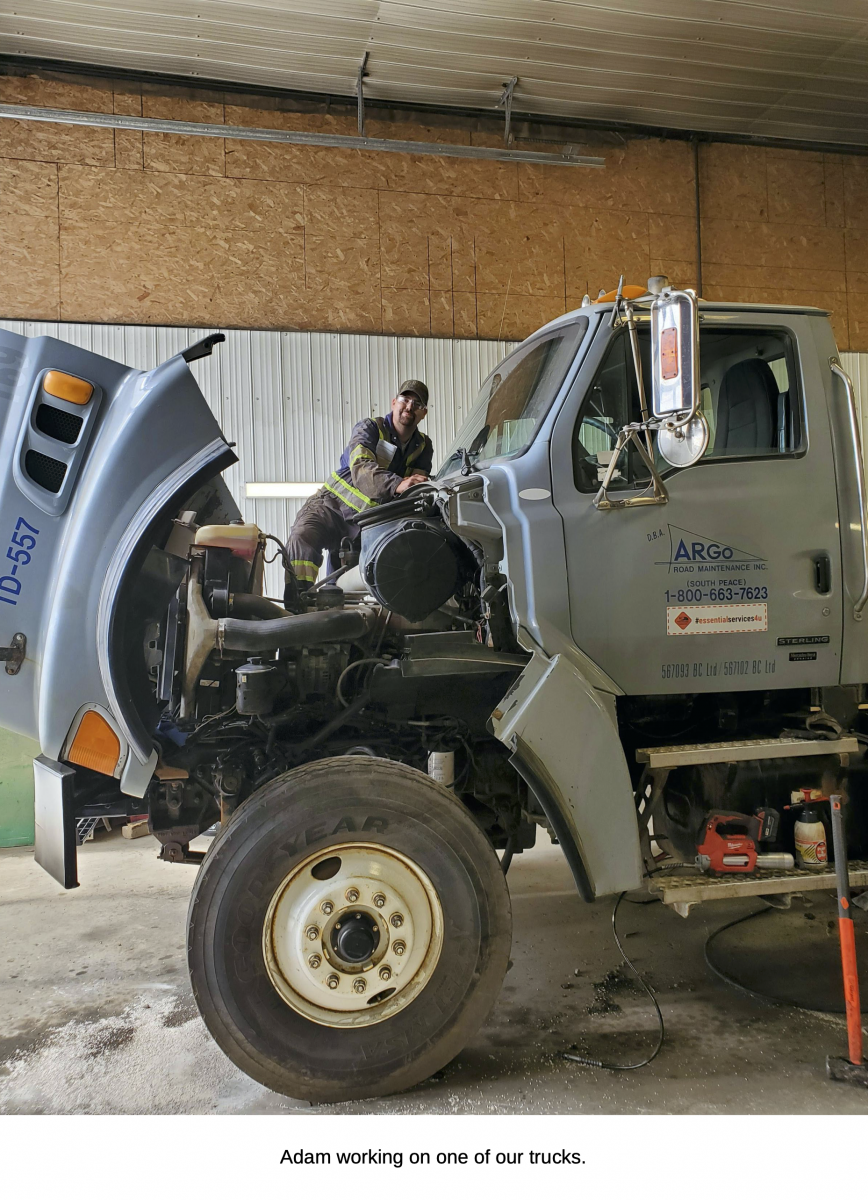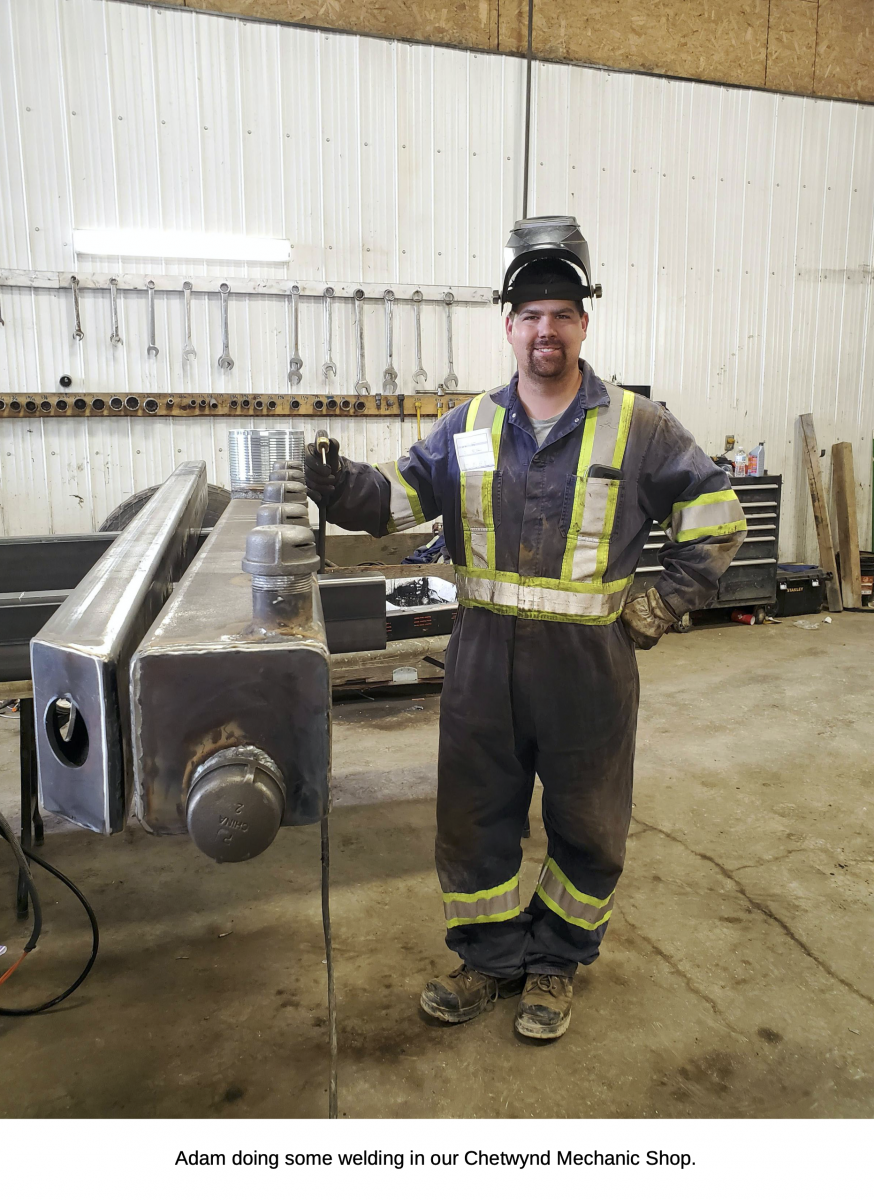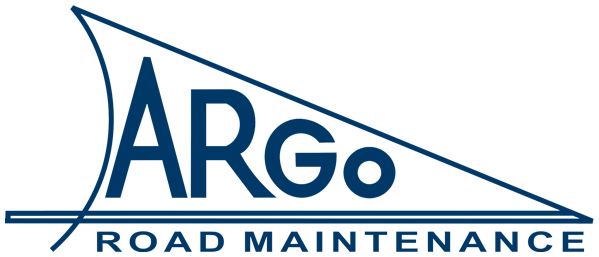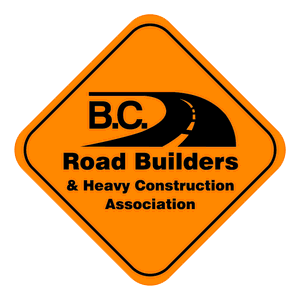Meet the Crew Behind the Cones: Adam Peterson
Posted: August 5, 2020 by Argo Road Maintenance
Our final ConeZoneCrews profile takes us behind the scenes to our Chetwynd mechanic shop where Adam Peterson tells us why he loves being a heavy-duty mechanic and what it’s like to care for the trucks and equipment you see on the roads.
But, first, you’re probably wondering why we’re talking to one of our mechanics as part of our series on road crew workers. We were hoping you ask!
Our trucks drive an average of 40,000 km/year, often in the most extreme weather conditions. Our mechanics ensure our vehicles and equipment are ready to go, so we can respond quickly and safely as required to all road and weather conditions.
… OK, back to Adam’s story.
What inspired you to become a mechanic?
I was always kind of gearhead [someone who is mechanically inclined] growing up, and my grandpa was an automotive mechanic. I grew up in his shop, and I guess I’ve had a love of pulling wrenches ever since.
What drew you to heavy-duty machinery rather than small engines, sports cars, motorcycles?
I got into heavy-duty machinery in part because of the location – there’s not much for sports cars up here. And, I had a friend who worked at Western Star in Grand Prairie. He suggested I come fix trucks. I already had automotive down pat, so I challenged myself with something new. And, it turned out it was my calling – I ended up being pretty good at it.
Is that what motivates you – the challenge?
There’s always something new. It keeps me sane. If it was the same old thing, at an assembly plant, well, it’d be hard. Here every day is different, unless you have a long project happening, but, even then, you run into different things. There’s a wide variety of repairs and fabrications and modifications to trucks, trailers, and equipment, which is nice too.
I like the challenge. I like to be able to say I did it.

I can tell, just listening to you speak, how much you enjoy it. I’m wondering, when you’re working on the machines, is it a lot of memorization and understanding how everything works together, or, is it in a sense quite intuitive. You learn to understand and read the machines just by listening to the sounds?
Yeah. Exactly. If you’re passionate about your work, you pick up on things. You listen, and you go, oh, I’ve worked on that engine before. I know what that sound is. Or, oh, there’s smoke coming out of that stack. I know what’s going wrong there.
You gain experience throughout the years: you tend to have an ear, an eye, and a smell out for everything. And, if I went back to automotive, I could be like oh, that thing has a weak spark plug on number four there. And, it’s like, well, how the heck do you tell that? It’s the same way I can tell when an injector’s missing on a big Detroit Diesel or something. You just pick it up along the way.
Cool! I also wanted to ask, you’re a relatively new employee, you’ve only been here a few months, is there anything about working in road maintenance that surprised you?
Yes, before I came here, I was managing a shop by myself, and when I came here, I was actually surprised by the amount of work that’s done in-house. I was under the impression that the shop wouldn’t be tooled up for a lot of the larger repairs and that they [the larger repairs] would need to be farmed out to the dealership. We don’t do tires here, but we do a lot.
For example, the boys took the cab off a loader, stripped it right down, and pulled the transmission. And one of our apprentices rebuilt it and is now putting it all back together. Or, if the brakes are no good in a Grader, we get the tires off, pull the chains out of it, repair the discs, and then put it all together. I’d never done that before, so that was a new experience for me. I don’t care who you are: there’s always something to learn. No matter how old you get.

Wow. That sounds like a lot of problem solving and attention to detail.
Oh yes. Very much so.
Is there anything you wish people knew about the work you do?
I think a lot of people don’t realize what’s truly involved. The scope of things – the amount of dedication it takes to make everything run. We’re working really hard as a team: I’m doing my best to make sure the trucks are in good shape and well-maintained (and that they’re back on the road quickly if they need larger repairs). And, our drivers [operators] and labourers are doing their best to keep the roads cleared and safe – for their families, for my kids and my family, and for everyone else on the road.
For example, in the event of a snowstorm, or large flood event, we’ve got all hands on deck. It’s like, hey, is that truck ready to go? And, we’re staying late, trying to make it happen.
What’s that pressure like? My car needs service and maintenance, and I’m not driving it every day, and I’m definitely trying to avoid driving in adverse conditions. I imagine the wear and tear on one of the big trucks or pieces of equipment is significantly more. And, it’s up to you, essentially, to keep it running and safe.
Oh yeah. Absolutely. It’s not even a comparison [between a passenger vehicle and one of our trucks]. Our trucks see a lot of miles annually compared to a regular truck, and they’re a lot heavier too. [A filled tandem plow weighs 36000kg (36 tonnes), about 20X as much as a large pickup] So, if your car or truck needs an oil change roughly every 10,000km, new brake pads every 40,000km, and new tires every two to five years, not to mention other basic service, you can imagine how much maintenance our trucks need. For starters, they need (on average) a new set of winter tires every winter – that’s 10 new winter tires per year (per truck) because the tandem plows have ten tires each. (Some have 14.)
And, now that you’ve said it [he laughs]. It is a little bit more pressure. I guess you kind of get used to it. Emergency repairs are unique, but there’s definitely a checklist. Basically, we bring the trucks in and start with the basics: is the insurance valid, are the papers there, are the plates on the truck, when was it last serviced, does it need a Major B [a type of service], do we need to take the tires off, do the wheels need to come off. We’re also checking and changing the fluids, the hoses, the engine and tire pressure, and running the computer to check all the codes.
That’s all involved. If a tire blows off on the road, or there’s a small leak, or something happens, and the truck comes back on the low bed, we get it off, and we go right through the damn thing from one end to another.
There is a bit of pressure there for sure, especially when you get your Red Seal. You’re responsible for the repairs. When the apprentices do the work, a Red Seal mechanic has to oversee and OK their work and sometimes help them through it. You don’t realize it, but there is a bit of stress there. If someone gets hurt, it’s on me.
Wow. That is a lot of pressure. And speaking of repairs, this winter, we heard several stories (including one from our Thompson Service Area) of plows getting hit by drivers passing on the right or driving too close. What are the ramifications of something like that from a shop’s perspective?
Luckily, we haven’t had any of that up here recently. I mean, there are times when the drivers are out and all the elements are against them (they can’t see behind them, can’t see in front of them, and they’re trying their best to stay on the road themselves, as well as clear it for traffic), and the plow snags a corner, which requires repair, but luckily we didn’t have any of the cases that you heard about down south this past season.
When that sort of thing happens though – let’s say a wing gets hit by a driver passing on the right [or as in Stan’s story a passing vehicle rips the molboard off a grader], the repercussions are pretty significant. If the wing gets hit, and it doesn’t wreck a cylinder, we’re ahead of the game. Otherwise, we’d have to send the cylinder away, and rebuild the arms and spikes. When that sort of thing happens, there’s a welder going full time as well as a mechanic, trying to get it back together. We’re pretty efficient, but it still takes time. That’s extra hours, additional materials, and downtime on the vehicle. And that’s just a relatively minor repair.
Youch! That’s downtime for the truck, which means it’s not out there doing its job. Not to mention the effects (physical and mental) that getting hit like that has on the crew.
Exactly.
Well, as we saw in our previous stories, there’s a lot our crew has to think about when they’re on the road, and as Adam explains, there’s a lot of behind the scenes work as well – everyone is doing their part to keep the roads safe and well-maintained. Those of us who are not on the road or in the shop every day, can also do our parts by giving workers and slow-moving vehicles plenty of space to do their work by driving with care and slowing down (and moving over) in roadside construction zones and for vehicles stopped along the road with flashing red, blue, or amber lights.
And, finally, a huge thank you to everyone on our team – those on the road and those behind the scenes. We’re grateful for your commitment and dedication!
Looking for more ConeZoneCrews stories? Check out Reg’s, Stan’s, and Tyler’s stories.



